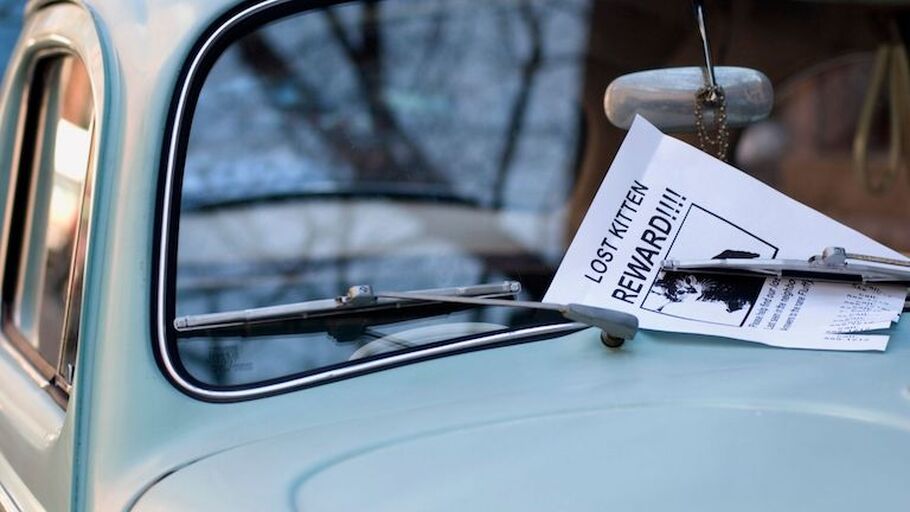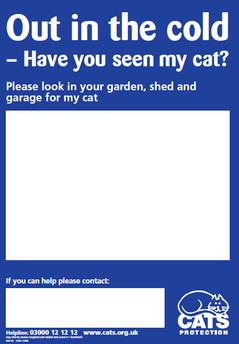Losing a cat can be a very distressing experience. Just like with missing people, you need to act quickly to ensure the best chance of getting your missing puss home quickly and safely. I have compiled an approach to searching cats that have disappeared or not come home to help you increase the chance of finding your missing moggy ASAP.
Preliminary Searches
Start your search early — don’t assume your cat will wander back of their own accord (eg if they are trapped or badly injured)
Search around the home & local area — in cupboards, under beds, behind furniture, in a washing machine or tumble drier, laundry basket, the cellar, loft space etc. Outside in your shed and garage, greenhouse, compost bin, even your car, including in the wheel arches and engine compartment. Cats like to seek out warm, dark places to hide sometimes, so look in even the most unlikely places. While you are searching, stop regularly and listen — give your cat a chance to answer your call.
Visit your immediate neighbours - ask them to look in their homes and garages, sheds and outbuildings. Has anyone had any delivery vans/tradesmen recently as cats will often get into open vehicles.
Search around the home & local area — in cupboards, under beds, behind furniture, in a washing machine or tumble drier, laundry basket, the cellar, loft space etc. Outside in your shed and garage, greenhouse, compost bin, even your car, including in the wheel arches and engine compartment. Cats like to seek out warm, dark places to hide sometimes, so look in even the most unlikely places. While you are searching, stop regularly and listen — give your cat a chance to answer your call.
Visit your immediate neighbours - ask them to look in their homes and garages, sheds and outbuildings. Has anyone had any delivery vans/tradesmen recently as cats will often get into open vehicles.
Tips when searching
- Search at different times of the day/night
- Take some dry food, and a cat carrier with you, or if your cat hates carriers take a pillow case!
- Paying particular attention to any garages, lock-ups, skips and empty properties
- Make a note of any empty houses for sale, and contact the estate agent in case they have shown someone round and shut the cat in
- Call for your cat by name and take time to listen for a reply
- Shake a box of their favourite biscuits, or squeeze a favourite squeaky toy may help
- Stop regularly, and listen - give your cat a chance to answer your call
- Stay in one area long enough for your pet to reach you if he is in the vicinity
Report Your Cat as "Missing"

Alert your cat's microchip company
Register your cat as missing and ask if they will also send flyers to all the vets in the area to keep their eyes peeled. Try making contact with Petlog first if you don't know which company your cat's chip is with. Or you could try using this other online CheckAChip service.
Contact veterinary surgeries in your area
Check if any cats have been brought in injured/unwell.
Also make sure you ask to register your cat on their missing cat list.
To find local vets click here
Contact your pet insurer
Many owners don't realise that a good pet insurance policy often includes cover for lost/stolen pets. This may include hundreds of pounds worth of advertising your cat as missing, laminated posters and even a reward for the safe return of your cat.
Word of Mouth - tell as many people locally as you can!
People that are all likely to be out and about and noticing cats at different times.
Tap into the power of social media
Even if you don't usually like using your account, it's amazing how many people offer support and keep an eye out for you. Get their face known. Don't give away too many details (see below about making a missing poster).
Contact or visit local animal charities and rescue centres:
It is possible your cat has been mistaken for a stray and been handed in. Be sure to register on their missing cat list or lost section of their webpage.
Register your cat as missing and ask if they will also send flyers to all the vets in the area to keep their eyes peeled. Try making contact with Petlog first if you don't know which company your cat's chip is with. Or you could try using this other online CheckAChip service.
Contact veterinary surgeries in your area
Check if any cats have been brought in injured/unwell.
Also make sure you ask to register your cat on their missing cat list.
To find local vets click here
Contact your pet insurer
Many owners don't realise that a good pet insurance policy often includes cover for lost/stolen pets. This may include hundreds of pounds worth of advertising your cat as missing, laminated posters and even a reward for the safe return of your cat.
Word of Mouth - tell as many people locally as you can!
People that are all likely to be out and about and noticing cats at different times.
- postman/woman
- milkman
- parents and neighbourhood children
- elderly neighbours
- dog walkers
Tap into the power of social media
Even if you don't usually like using your account, it's amazing how many people offer support and keep an eye out for you. Get their face known. Don't give away too many details (see below about making a missing poster).
Contact or visit local animal charities and rescue centres:
It is possible your cat has been mistaken for a stray and been handed in. Be sure to register on their missing cat list or lost section of their webpage.
|
Cats Protection
Ph 03000 121212 Email [email protected] Each branch tends to have their own "lost and found" page. The most local branches are:
RSPCA Ph 0300 1234 999 (England & Wales) The most local rescue centre is: Millbrook, Chobham, Surrey SSPCA Ph 0300 0999 999 (Scotland) USPCA Ph 0283 0251 000 (Northern Ireland) |
Thames Valley Animal Welfare
Ph 0118 972 2082 or 0118 972 1871 Diana Brimblecombe Animal Rescue Centre, Wokingham Ph 0118 934 1122 CLAWS (Cat Lovers Animal Welfare Society), Maidenhead Ph 0118 934 1699 Email: [email protected] The Blue Cross Ph 0300 790 9903 Email: [email protected] PDSA Ph 0800 917 2509 |
Make & Distribute A Missing Poster
|
What to include in your poster:
|
NB: Moisture can rapidly deteriorate the quality of a poster making photos unrecognisable and text unreadable. If possible always laminate your posters.
Consider photocopying the poster into A5 leaflets to drop through letterboxes in the neighbourhood. Many cats ‘go missing’ simply because they are befriended by a neighbour.
Don't forget where you've put the posters. If they come home or are found, do the right thing and go round and remove the poster so people know to stop looking, keep the place tidy and free up a space for other people to post about their missing kitties.
Consider photocopying the poster into A5 leaflets to drop through letterboxes in the neighbourhood. Many cats ‘go missing’ simply because they are befriended by a neighbour.
Don't forget where you've put the posters. If they come home or are found, do the right thing and go round and remove the poster so people know to stop looking, keep the place tidy and free up a space for other people to post about their missing kitties.
Places to display your posters:
- Local shop windows/noticeboards
- Post Offices
- Lampposts (check with your local council first)
- Schools
- Churches and community halls
- Sport and recreation centres.
- Train/Bus stations
- Petrol stations
- Pubs/restaurants
- Police - take a more personal approach and walk in to your local police station with a poster rather than phoning the switchboard. Ask if they will let you put a poster up... they can only say "no".
Request the contact number for your local beat bobby or Community Support Office (PCSO) and ask them to circulate that your cat is missing so they can keep their eyes peeled while they are patrolling.
Widen your search
Widen your search to hedgerows, open ground, woodland, farmland - ask for permission to check in agricultural buildings. Often cats get carried away on their adventures then become disorientated and unable to find their way home.
Check with your local council’s refuse department - in case your cat was knocked down on the road and has been collected. Contact your local Council to see if they have picked up a cat from the roadside as they are obliged to keep records of cats collected and to retain identity information. Unfortunately most councils have no facility for checking for microchips, so they will not contact you in this circumstance.
Contact the local fire brigade to ask if they have been called out recently to rescue any cats from trees etc.
Check with your local council’s refuse department - in case your cat was knocked down on the road and has been collected. Contact your local Council to see if they have picked up a cat from the roadside as they are obliged to keep records of cats collected and to retain identity information. Unfortunately most councils have no facility for checking for microchips, so they will not contact you in this circumstance.
Contact the local fire brigade to ask if they have been called out recently to rescue any cats from trees etc.
Additional ideas
Register your cat with local and national lost and found agencies
Many of these agencies operate on the internet and can provide excellent standout posters with all the necessary information, social media coverage etc. They can also provide a general contact number for information about your cat, rather than your personal details and can take anonymous calls from members of the public who may have useful information but not want to come forward (eg road traffic accidents involving cats). Many can work in conjunction with pet insurers.
Here a some examples:
Cat Chat Forum
Animal Search UK
National Pet Register
Pets Bureau
Pets Located (Annual fee of ~ £10 to advertise your cat as missing)
Pets Reunited
Take out an advert in a local paper and approach your local radio station - see if they will put out an appeal.
Surround your garden with familiar smells/items to help guide a lost/confused cat home
Leave your cat's favourite toy or piece of his (unwashed) bedding in your garden, ideally somewhere sheltered from rain. Also leave out an unwashed item of your clothing, which will have your smell on it, again in a sheltered place
Put outside the contents of your hoover bag near the perimeter of your property . Previously it has been suggested that using used cat litter from your cat's litter box may lead them home to a familiar smell. The concern is though, that the scents in urine and faeces may also lure in other local cats or predators that could deter your cat from coming home - so best to stick to more subtle smells like hoover contents and bedding.
Many of these agencies operate on the internet and can provide excellent standout posters with all the necessary information, social media coverage etc. They can also provide a general contact number for information about your cat, rather than your personal details and can take anonymous calls from members of the public who may have useful information but not want to come forward (eg road traffic accidents involving cats). Many can work in conjunction with pet insurers.
Here a some examples:
Cat Chat Forum
Animal Search UK
National Pet Register
Pets Bureau
Pets Located (Annual fee of ~ £10 to advertise your cat as missing)
Pets Reunited
Take out an advert in a local paper and approach your local radio station - see if they will put out an appeal.
Surround your garden with familiar smells/items to help guide a lost/confused cat home
Leave your cat's favourite toy or piece of his (unwashed) bedding in your garden, ideally somewhere sheltered from rain. Also leave out an unwashed item of your clothing, which will have your smell on it, again in a sheltered place
Put outside the contents of your hoover bag near the perimeter of your property . Previously it has been suggested that using used cat litter from your cat's litter box may lead them home to a familiar smell. The concern is though, that the scents in urine and faeces may also lure in other local cats or predators that could deter your cat from coming home - so best to stick to more subtle smells like hoover contents and bedding.
Lastly, try not to despair!
Unfortunately some cats are victims of fatal road traffic accidents but sometimes they just lose their way and need time to befriend someone new and get identified. Sometimes, just knowing what's happened even if it's the worst case scenario, can help you to have some closure and importantly know that you have done the best that you can to get a happier outcome.
According to the Missing Pet Bureau, 3,200 cats go missing every week but reassuringly, many cats also turn up after months, even years after originally going missing! Don't give up hope.
Hopefully you'll be reunited with you cat very soon. Please don't forget to contact everyone you notified and let them know the outcome (good or bad) and update/take down any posters or ads that you've posted.
Unfortunately some cats are victims of fatal road traffic accidents but sometimes they just lose their way and need time to befriend someone new and get identified. Sometimes, just knowing what's happened even if it's the worst case scenario, can help you to have some closure and importantly know that you have done the best that you can to get a happier outcome.
According to the Missing Pet Bureau, 3,200 cats go missing every week but reassuringly, many cats also turn up after months, even years after originally going missing! Don't give up hope.
Hopefully you'll be reunited with you cat very soon. Please don't forget to contact everyone you notified and let them know the outcome (good or bad) and update/take down any posters or ads that you've posted.
|
Consider attaching a GPS Cat Tracker to your cat's collar. I'd definitely have a think about the size of your cat and the weight/bulk of the device carefully. This is also not a cheap option if your cat is a serial collar-loser. I would always advise any cat has a quick-release collar and therefore if they lose the collar they lose the tracker - that said, at least you should be able to locate the missing kit (although perhaps not the cat!).
|
Another option which is more lightweight and less expensive is the TabCat which is made by the company that created Loca8tor for missing keys, phones etc. It's not a GPS tracker device - think of it more like the principle behind a metal detector. You attach a special lightweight tag to your cat's collar and then you can hunt around with the detector handset. It will detect your cat within a 120 metre or 400 foot range of the handset whether they're indoors or outdoors.
Activating the search function triggers a visual flashing and/or audible beep on both the handset and the cat's tag. The flashes/beep change in frequency the closer you get (like a metal detector). It's also a great training device for getting your cat to come when called. You can train your cat to come when their tag beeps this (think Pavlov's cat!).
Activating the search function triggers a visual flashing and/or audible beep on both the handset and the cat's tag. The flashes/beep change in frequency the closer you get (like a metal detector). It's also a great training device for getting your cat to come when called. You can train your cat to come when their tag beeps this (think Pavlov's cat!).








